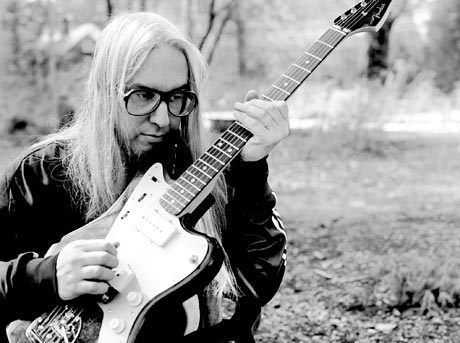My earliest memory of punk is the Ramones.
I remember hearing them and not being sure if they were a joke band or a cartoon or what. I wasn’t quite sure what to make of them. Then I got really into it. I don’t know what convinced me that they weren’t a joke, but I liked the primitiveness.
I’m from Boston, Massachusetts.
I started playing drums really young, but there weren’t many people to play with. There was, however, a record store in the next town, and the guy who ran it would go to England to buy records, which was pretty cool. You could even tell him which records you wanted and he’d go get them. Then, one day when I was in there, I saw an advert up for a band looking for a drummer who was into Discharge and Anti-Pasti. So I called the guy, who lived a town away in a really blue-collar area, and we formed Deep Wound. My parents used to have to drive me to rehearsals.
The sound of English punk bands was all I knew at first.
They’d have magazines in the record store with lists like ‘The 100 Best Punk Records Ever’, and they were all from Britain. I didn’t really know much about American hardcore at the time. The first American labels we really loved were Dischord and Touch and Go. We used to get their albums sent to us directly through mail order because the store just didn’t stock any American hardcore music. Before I got into hardcore I listened to bands like Rudimentary Peni, 4 Skins and Discharge because I was just one person collecting on his own. I didn’t know anything about skinheads. I just saw these records, listened to them, and if I liked it, I liked it. I had no idea what was behind it.
Deep Wound was a hardcore band though, even though there wasn’t much of a scene.
At first, we were the only hardcore band around. We had an audience that were really young and liked hardcore, but there were only ever a couple of other hardcore bands. It didn’t matter though, because once we discovered hardcore we related so much more to it. I was in this hippie town and it was difficult to rebel. There were just all these acid casualties everywhere. I was really tired of it, and I didn’t relate to the whole Sid Vicious-junkie vibe either. Then I heard Minor Threat and it was already kind of where I was. They were punk rock and they weren’t junkies.
The uniformity of punk rock and hardcore has always been a big novelty attraction for some people.
But that wasn’t where I was at. People would try to be all like, ‘Oh, now we’ve got hardcore scene, we need to organise team meetings!’ Fuck off. Kids wanted to organise it as a big club where you could instantly have all these friends. I never felt part of that. I was into punk, but I didn’t see it that way.
At the time I thought it was great.
And I still do. It seemed like a new kind of music that was speaking about my generation. It was ours, but it just seemed like it died pretty quickly. All of a sudden, hardcore was over. I still liked the music, but it was time to move on. Kind of like The Birthday Party. They were a band that people gravitated to. They were taking the music out of hardcore, but it sounded really progressive. In a way, hardcore consumed itself. It’s kind of like sexual frustration – as soon you get a girlfriend, that energy just disappears.
It’s weird how punk has endured for so long.
When we played SXSW, all these bands came up to me and asked me about Deep Wound. Kids are still really into hardcore and they know all the stories. But I still know punk rock when I see it. It always has this certain something. I’m not sure what it is, but I think it’s cool that it’s survived for so long though. It’s certainly different now though. I see bands at shows calling themselves hardcore and I’m not sure. But it’s cool.
Hardcore is still very important to me.
It was my youth and I still have all those records. Recently, I had a Finnish band stay at my house and we pulled out all these LPs and talked about them. It’s definitely been an influence on how I make music today. I like making aggressive music, and using my energy in doing so. In another ten or twenty years time, I expect kids will still probably be doing the same thing.



